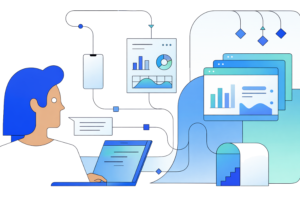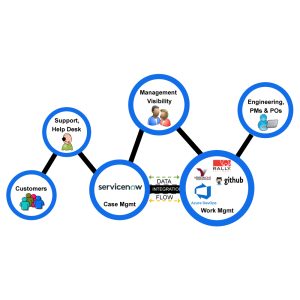Artificial intelligence is no longer a futuristic buzzword it has become a strategic necessity for modern enterprises. Companies across industries are using AI to cut operational costs, streamline processes, and deliver more personalized customer experiences. As adoption accelerates, one recurring question dominates boardrooms: “Is Watson AI worth it?”
In 2025, this question carries more weight than ever. The digital economy is maturing, competition is fiercer, and customer expectations are higher. To stay competitive, businesses must carefully evaluate the ROI of IBM Watson AI, not just in terms of direct cost savings but also in how it drives revenue growth, innovation, and compliance.
Watson has evolved far beyond its early days as a natural language processor. Today, it supports AI automation, advanced analytics, voice-driven customer engagement, and predictive decision-making. Backed by IBM Cloud Pak, Watson AI provides enterprises with scalable infrastructure, secure data governance, and hybrid cloud flexibility.
This blog will explore whether Watson AI delivers measurable ROI in 2025, how organizations can calculate its value effectively, and what results real-world businesses are achieving with it. The goal is to answer a critical question: Is Watson AI a cost or an investment in long-term growth?
Understanding Watson AI ROI
When executives ask, “How do we measure Watson AI ROI?” the answer extends far beyond immediate cost savings. A true evaluation of ROI considers three major dimensions that together define the value of IBM Watson AI.
- Operational Efficiency: Organizations achieve measurable savings by reducing manual tasks, automating workflows, and accelerating data processing. Routine activities like document review, compliance checks, or customer service requests become faster and less error-prone, creating long-term efficiency gains.
- Revenue Growth: Watson AI drives top-line growth by enabling hyper-personalized experiences, predictive analytics, and data-driven decision-making. From recommending financial products to forecasting demand in retail, the technology creates opportunities for new revenue streams and stronger customer loyalty.
- Risk Reduction: Advanced AI governance, fraud detection, and regulatory compliance lower business risk. By integrating governance directly into workflows, companies reduce penalties, strengthen trust, and safeguard sensitive data.
Unlike isolated AI tools, Watson AI within IBM Cloud Pak ensures scalability and enterprise alignment, helping firms realize ROI within months instead of years.
How IBM Watson AI Delivers Business Value
1. AI Automation for Efficiency
Businesses are automating repetitive workflows like customer service inquiries, document processing, and compliance reporting with Watson AI. By integrating with IBM Cloud Pak, these automations scale securely across hybrid environments.
2. Advanced Analytics and Insights
Watson AI analyzes structured and unstructured data from financial records to call transcripts. Executives often ask, “Can Watson AI improve decision-making speed?” The answer is yes. By surfacing real-time insights, it empowers leaders to act faster with confidence.
3. Smarter Customer Engagement
With voice and chatbot capabilities, IBM Watson AI personalizes customer interactions. Retailers, banks, and healthcare providers use Watson-powered assistants to resolve issues instantly, boosting satisfaction and loyalty.
4. Compliance and Governance
Watson AI offers built-in governance tools to align with global and regional regulations. Whether under GDPR, HIPAA, or Malaysia’s PDPA, businesses can ensure secure, auditable workflows.
Real-World Examples of Watson AI ROI
- Finance: A Southeast Asian bank reduced onboarding times by 40% using Watson AI automation while cutting compliance errors by half.
- Healthcare: A hospital group deployed Watson for diagnostics and patient queries, resulting in a 30% faster turnaround on lab results and improved patient satisfaction.
- Retail: An e-commerce platform used Watson AI personalization to boost repeat purchases by 25%, directly increasing revenue.
- Manufacturing: Factories applied Watson predictive analytics for equipment maintenance, lowering downtime by 20% and saving millions annually.
These cases show that ROI is not abstract it is measurable, repeatable, and scalable.
Integration with IBM Cloud Pak
A frequent question from IT leaders is, “How does IBM Cloud Pak enhance Watson AI ROI?” The answer lies in its ability to provide a flexible, secure, and enterprise-grade foundation for deploying Watson AI at scale.
IBM Cloud Pak is a containerized, cloud-native platform that enables organizations to seamlessly integrate Watson AI into existing systems without overhauling infrastructure. This minimizes disruption and accelerates time-to-value.
- Scalability: Businesses can start with focused use cases, such as chatbots or fraud detection, and gradually expand into enterprise-wide automation. This modular growth ensures ROI is captured at every stage of deployment.
- Hybrid Cloud Flexibility: With support for public, private, and on-premise environments, IBM Cloud Pak ensures enterprises can align AI workloads with their compliance, security, and cost requirements. This is particularly valuable in industries like finance and healthcare.
- Unified Governance: Cloud Pak comes with integrated governance tools that allow organizations to manage sensitive data securely, while meeting regional and industry-specific regulations.
By leveraging Watson AI on IBM Cloud Pak, businesses not only reduce implementation friction but also achieve faster ROI by combining AI innovation with enterprise-ready stability.
Measuring ROI: Framework for 2025
To evaluate ROI effectively, businesses should consider:
- Baseline Costs: Identify costs of current processes without AI.
- AI-Driven Improvements: Track efficiency gains, time saved, and error reductions.
- Revenue Impact: Measure sales uplift, customer retention, and upselling enabled by Watson AI.
- Risk Mitigation: Quantify avoided compliance fines or fraud losses.
For example, if a bank reduces loan processing from 7 days to 1 day, the ROI is both financial (more loans processed) and reputational (improved customer trust).
Key Industries Driving Watson AI ROI
Finance
Banks rely on IBM Watson AI for risk scoring, fraud detection, and personalized financial planning. By integrating AI automation, they reduce costs and boost customer loyalty.
Healthcare
Hospitals adopt Watson for medical imaging, diagnostics, and patient engagement. The ROI comes in improved accuracy, reduced turnaround times, and better patient outcomes.
Retail
Retailers use Watson AI for personalization, inventory management, and customer engagement. The ROI is higher sales and improved retention.
Manufacturing
Factories integrate Watson AI for predictive maintenance and supply chain optimization, reducing downtime and logistics costs.
Government
Public agencies leverage Watson for citizen services, multilingual support, and compliance. ROI here is measured in efficiency and citizen satisfaction.
Challenges in Calculating ROI
Executives often ask, “Why is it so difficult to quantify Watson AI ROI?” The reason is that traditional ROI metrics focus only on cost savings, while Watson AI delivers a mix of both tangible and intangible benefits.
- Improved Customer Trust: Building trust through transparent AI decisions or faster response times is invaluable. Though not always reflected directly in financial statements, it strengthens loyalty and long-term retention.
- Agility and Innovation: Watson AI accelerates product launches, speeds up regulatory reporting, and enables rapid adaptation to new market conditions. This agility adds competitive value that is difficult to price in advance.
- Employee Productivity: By automating repetitive work, staff can dedicate more time to strategy, customer engagement, and innovation. This shift not only reduces errors but also improves morale and efficiency.
Focusing solely on expenses risks undervaluing the strategic ROI that Watson AI provides.
Future Outlook: Watson AI in 2025 and Beyond
By 2025, Watson AI is set to become an even more critical driver of digital transformation and ROI across industries. Its evolution will move in three key directions that redefine how businesses adopt and measure AI.
- Deeper Industry Specialization: Watson AI is no longer a one-size-fits-all solution. In finance, it enhances fraud detection and risk scoring. In healthcare, it powers precision medicine and patient engagement. In retail, it strengthens demand forecasting and hyper-personalization, while in logistics it streamlines supply chain planning. This specialization ensures that ROI is directly tied to industry outcomes.
- AI + Cloud Synergy: With tighter integration into IBM Cloud Pak, Watson AI will offer end-to-end automation across hybrid cloud environments. This synergy gives enterprises the flexibility to scale AI securely across global operations while meeting compliance requirements.
- Explainable AI at Scale: Regulators and customers demand transparency. Watson AI provides explainable, auditable outputs that build trust and make AI adoption sustainable.
When executives ask, “Is Watson AI still relevant in 2025?” the answer is clear: Watson AI remains not only relevant but a cornerstone of digital transformation ROI.
Is Watson AI Worth It?
The evidence strongly suggests that Watson AI is not just worth the investment it is essential for enterprises looking to remain competitive in 2025 and beyond. Its measurable ROI can be seen in three major areas: cost savings through automation, revenue growth via personalization and predictive analytics, and risk reduction through compliance-ready governance. Unlike point solutions, Watson AI when deployed with IBM Cloud Pak delivers enterprise-grade scalability, hybrid cloud flexibility, and robust data security, making it future-ready for evolving business landscapes.
For executives, the real question is no longer “Is Watson AI worth it?” but rather “How quickly can our organization implement it to maximize ROI?”. Companies that delay risk losing ground to agile competitors who are already capturing efficiency gains and market share with AI automation.
From financial services enhancing fraud detection, to healthcare providers personalizing patient care, to retailers streamlining supply chains, IBM Watson AI proves its ROI across industries. More importantly, it acts as a strategic enabler of innovation, preparing businesses for an AI-first economy. In short, Watson AI is not just a tool it’s an investment in resilience, agility, and sustainable growth.




